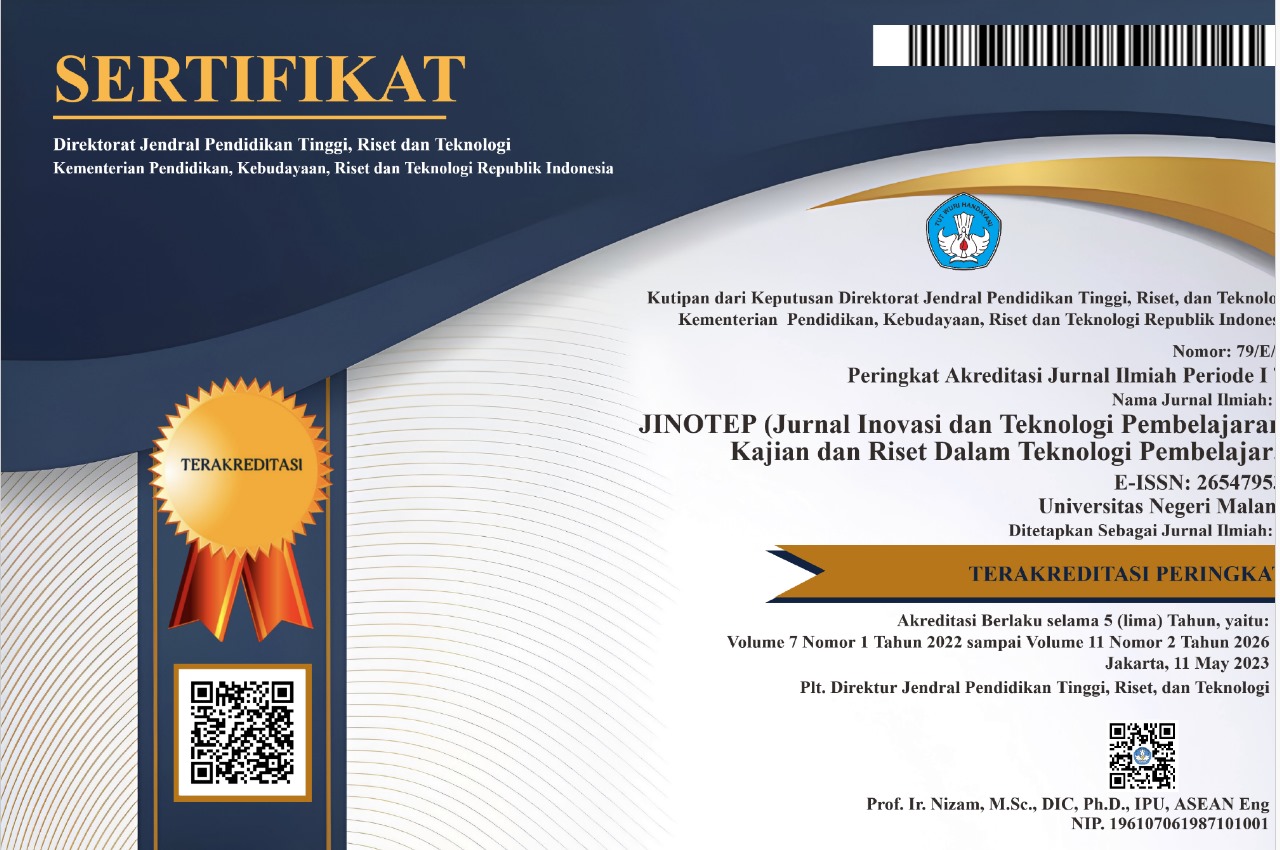Penggunaan Game Edukasi Digital Sebagai Sarana Pembelajaran Anak Usia Dini
Abstract
Abstrak: Perkembangan dan dukungan teknologi digital telah memberikan peluang baru untuk memberikan pembelajaran dalam bentuk game edukasi digital pada anak usia dini. Karena anak-anak sangat terkait dengan permainan, maka game edukasi digital menjadi langkah strategis untuk memberikan pengalaman baru pembelajaran. Penelitian ini menggunakan pendekatan literature review untuk menganalisis secara komprehensif dari artikel yang dipublikasikan sejak tahun 2013 hingga 2018. Temuan penelitian ini mengungkapkan sebagaian besar artikel fokus dalam mengembangakan game edukasi digital sebagai alat pembelajaran anak usia dini. Metode experiment dan survei ditemukan menjadi metode utama dari sebagian besar artikel untuk evaluasi.
Abstract: The development and support of digital technology have provided new opportunities to provide learning in the form of digital educational games for early childhood. Because children are strongly associated with games, digital education games are a strategic step to provide new learning experiences. This study uses the literature review approach to analyze comprehensively from articles published from 2013 to 2018. The findings of this study reveal that most articles focus on developing digital education games as early childhood learning tools. The experiment and survey methods were found to be the main method of most articles for evaluation.
Keywords
Full Text:
PDFReferences
Miller, T. (2018). Developing numeracy skills using interactive technology in a play-based learning environment. International Journal of STEM Education, 5(1). doi:10.1186/s40594-018-0135-2
Lamrani, R., Abdelwahed, E. H., Chraibi, S., Qassimi, S., & Hafidi, M. (2018). Gamification and Serious Games Based Learning for Early Childhood in Rural Areas. New Trends in Model and Data Engineering, 79–90. doi:10.1007/978-3-030-02852-7_7
AlZubi, T., Fernandez, R., Flores, J., Duranb, M., & Cotos, M. (2018). Improving the working memory during early childhood education through the use of an interactive gesture game-based learning approach. IEEE Access, 1–1. doi:10.1109/access.2018.2870575
Kalmpourtzis, G., Vrysis, L., & Veglis, A. (2016). Teaching game design to students of the early childhood through Forest Maths. 2016 11th International Workshop on Semantic and Social Media Adaptation and Personalization (SMAP). doi:10.1109/smap.2016.7753396
Edwards, S. (2013). Digital play in the early years: A contextual response to the problem of inte-grating technologies and play-based pedagogies in the early childhood curriculum. European Early Childhood Education Research Journal, 21(2),199–212. doi.org/10.1080/1350293X.2013.789190
Nikiforidou, Z. (2018). Digital Games in the Early Childhood Classroom: Theoretical and Practical Considerations. Digital Childhoods, 253–265. doi:10.1007/978-981-10-6484-5_16
Crompton, H., Lin, Y.-C., Burke, D., & Block, A. (2017). Mobile Digital Games as an Educational Tool in K-12 Schools. Perspectives on Rethinking and Reforming Education, 3–17. doi:10.1007/978-981-10-6144-8_1
Akman, B., & Güçhan Özgül, S. (2015). Role of Play in Teaching Science in the Early Childhood Years. Research in Early Childhood Science Education, 237–258. doi:10.1007/978-94-017-9505-0_11
Oblinger, D. (2004). The next generation of educational engagement. Journal of Interactive Media in Education, 8, 1–18. doi.org/10.5334/2004-8-oblinger.
Stephen, C., & Plowman, L. (2014). Digital play. In: Brooker, L., Blaise, M., Edwards, S. (eds.) The Sage Handbook of Play and Learning in Early Childhood Education, 330–341. Sage, Los Angeles/London.
Plowman, L. (2016) Learning technology at home and in preschool. Rushby, N., Surry, D. (eds.) Wiley Handbook of Learning Technology, 96–112. Wiley-Blackwell, Malden
Edwards, S. (2013). Digital play in the early years: A contextual response to the problem of integrating technologies and play-based pedagogies in the early childhood curriculum. European Early Childhood Education Research Journal, 21(2),199–212.
doi.org/10.1080/1350293X.2013.789190.
Kebritchi, M., & Hirumi, A. (2008). Examining the pedagogical foundations of modern educationalcomputer games. Computers & Education, 51, 1729–1743. doi.org/10.1016/j.compedu.2008.05.004
Klopfer, E., Osterweil, S., & Salen, K. (2009). Moving learning games forward: Obstacles, opportunities, and openness. Cambridge, MA: The Education Arcade
Homer, B. D., Kinzer, C. K., Plass, J. L., Letourneau, S. M., Hoffman, D., Bromley, M., … Kornak, Y. (2014). Moved to learn: The effects of interactivity in a Kinect-based literacy game for beginning readers. Computers & Education,74,37–49. doi:10.1016/j.compedu.2014.01.007
Johnson, J., & Christie, J. (2009). Play and digital media. Computers in the Schools, 26(4),284–289. doi.org/10.1080/07380560903360202.
Leitner, P., Khalil, M., & Ebner, M. (2017). Learning Analytics in Higher Education—A Literature Review. Studies in Systems, Decision and Control, 1–23. doi:10.1007/978-3-319-52977-6_1
DOI: http://dx.doi.org/10.17977/um031v6i12019p039
Refbacks
- There are currently no refbacks.
Copyright (c) 2019 Andri Setiawan, Henry Praherdhiono, Sulthoni

This work is licensed under a Creative Commons Attribution-ShareAlike 4.0 International License.
======================================================================
Jurnal Inovasi dan Teknologi Pembelajaran published by Universitas Negeri Malang in collaboration with the Asosiasi Program Studi Teknologi Pendidikan Indonesia (APS TPI) and Ikatan Profesi Teknologi Pendidikan Indonesia (IPTPI) with a MoU.
Publisher Address:
Educational Technology Laboratorium, Building D5, 1st Floor
Faculty of Education, Universitas Negeri Malang
Semarang St. No. 5, Malang City, East Java Province, Postal Code 65145
Email: jinotep.fip@um.ac.id
======================================================================

JINOTEP is licensed under a Creative Commons Attribution-ShareAlike 4.0 International License.
JINOTEP Statistics (Since July 13th, 2020)


.png)




.png)
1.png)
1.png)
4.png)
2.png)
1.png)
1.png)
.png)


_3.png)





1.png)
.png)